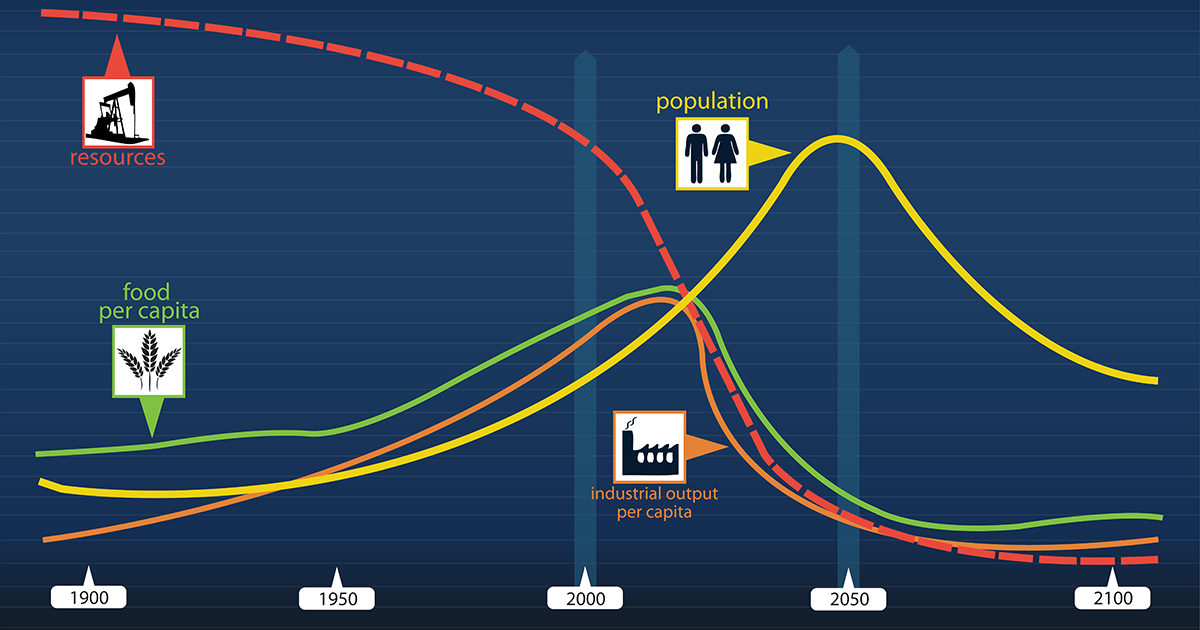
We Saw It Coming And We Still Bought It
I have a great read to recommend this week — an outstanding interview with Dennis Meadows about the (somewhat) famous Limits to Growth study he led at MIT about 45 years ago. This interview was published in June of 2015, but I just discovered it, and it seems very appropriate timing, in remembrance of systems dynamics pioneer Jay Forrester, who we lost recently.
Growing, Growing, Gone: Reaching the Limits
The Limits to Growth study is not famous enough. In fact, we’ve ignored it, aimed the car of human civilization toward a cliff, and put the pedal to the metal. Why we’ve ignored the study is just one of the interesting topics explored here. A major tip of the hat to Great Transition Initiative, Tellus Institute, Allen White and Dennis Meadows for this must-read. I devoured this interview, remarkable in its candor and detail. It’s not long and it’s very accessible. Give it a read, and share with everyone you think has a brain!
“…the issues about which we were talking then (and still talk about today)—hunger, poverty, oil depletion, climate change—are not in themselves problems; they are symptoms. The problem is continued material growth in a physically finite world.
Continual physical growth of population and economic activity eventually reaches the point where the globe simply cannot accommodate anymore. Biophysical systems press back, whether through disease, scarcity, climate, or other response mechanisms. These pressures are danger signals, indicating overshoot of some aspect of the planet’s physical limits.”
I’ve met Dennis Meadows on a couple of occasions, and interviewed him for my documentary, GrowthBusters: Hooked on Growth (free online screening this week). He is smart, no-nonsense, and somehow still put together after watching our society completely ignore the computer scenarios that have turned out to be astonishingly accurate. Here’s one astute bit about why The Limits to Growth ended up being largely ignored:
“At the risk of oversimplification, there are two kinds of people: those who decide which salient facts they like and then try to trace their implications, and those who decide which implications they like and then look for salient facts to justify them. You see this distinction in full display in contemporary debates around climate change.
The economics profession is based on the assumption that continual growth is possible and desirable. Likewise, most politicians have a predisposition for growth because it makes the problems they address—unemployment, poverty, diminished tax bases—more tractable. Instead of having to divide a fixed pie, which gets you in trouble with some constituents, you can grow the pie so that nobody has to make a sacrifice or compromise. So there was—and is—a set of vested interests in the notion of growth.”
Every sentence, every paragraph is rich with this great man’s insights. I could cut and paste samples all day. But you need to read it. I guarantee it will make you sad; I’m sorry. But you must read it, and pass it on. Be sure to take note of the Graham Turner item in the EndNotes. Turner’s research verified that we have followed The Limits to Growth team’s “business-as-usual” scenario almost to a T. That does not portend a rosy future. The original The Limits to Growth report is available online here.
I borrowed a line from the David Gray/Annie Lennox duet, Full Steam, for the title of this post. A great piece of work, though also sad.
Join me in celebrating enlightened thinking and busting pro-growth bias in the media. Click this button:
Tags: economic growth, gdp growth, limits to growth, overpopulation, overshoot, population growth, sustainability
Trackback from your site.
